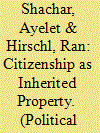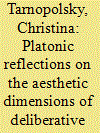| Srl | Item |
| 1 |
ID:
077444


|
|
|
|
|
| Publication |
2007.
|
| Summary/Abstract |
The global distributive implications of automatically allocating political membership according to territoriality (jus soli) and parentage (jus sanguinis) principles have largely escaped critical scrutiny. This article begins to address this considerable gap. Securing membership status in a given state or region- with its specific level of wealth, degree of stability, and human rights record- is a crucial factor in the determination of life chances. However, birthright entitlements still dominate both our imagination and our laws in the allotment of political membership to a given state. In this article we explore the striking conceptual and legal similarities between intergenerational transfers of citizenship and property. The analogy between inherited citizenship and the intergenerational transfer of property allows us to use existing qualifications found in the realm of inheritance as a model for imposing restrictions on the unlimited and perpetual transmission of membership-with the aim of ameliorating its most glaring opportunity inequalities
|
|
|
|
|
|
|
|
|
|
|
|
|
|
|
|
| 2 |
ID:
077445


|
|
|
|
|
| Publication |
2007.
|
| Summary/Abstract |
This essay utilizes Plato's insights into the role of shame in dialogical interactions to illuminate the aesthetic dimensions of deliberative democracy. Through a close analysis of the refutation of Polus in Plato's dialogue, the Gorgias, I show how the emotion of shame is central to the unsettling, dynamic, and transformative character of democratic engagement and political judgment identified by recent aesthetic critics of Habermas' model of communicative action and democratic deliberation. Plato's analysis of shame offers a friendly amendment to these aesthetic critiques by showing how the psychological forces at the heart of shame make the outcome of our political engagements with others uncertain and unsettling, even while they make possible the kind of self-reflexivity necessary to foster the deliberative virtue of sincerity or truthfulness
|
|
|
|
|
|
|
|
|
|
|
|
|
|
|
|
| 3 |
ID:
077442


|
|
|
|
|
| Publication |
2007.
|
| Summary/Abstract |
Rule of law is usually analyzed exclusively in reference to domestic peace within the political entity. Yet, establishing a powerful independent legal system can have a major impact on peaceful relations between political entities. This article evaluates the Palestinian Authority's performance in creating democratic and legal institutions from its inception in the summer of 1994 until the outbreak of the armed conflict between Israel and the Palestinians in September 2000. Three potential explanations drawn from the literature on state formation are evaluated in explaining the outcome: the foreign intervention thesis blames the failure on the asymmetry of power between Israel and the PLO; the domestic structural claim is that the weakness of the legal system stems from the unwillingness of the ruler to limit his power; and the cultural argument claims that only Anglo-Saxon and European states are truly liberal and democratic. The findings show that the quest for power led to centralization of authority in the executive, despite valiant attempts by politicians and civil society to avert such an outcome, and the article identifies the types of obstacles that need to be overcome to transform the Palestinian entity into a democratic reality that would promote peaceful coexistence with its neighbors.
|
|
|
|
|
|
|
|
|
|
|
|
|
|
|
|